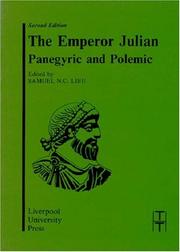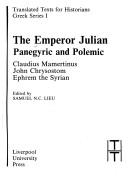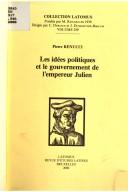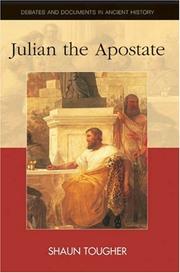Book
ISBN: 2262000751 9782262000752 Year: 1977 Volume: 3 Publisher: Paris Perrin
Abstract | Keywords | Export | Availability | Bookmark
 Loading...
Loading...Choose an application
- Reference Manager
- EndNote
- RefWorks (Direct export to RefWorks)
Emperors --- Philosophers --- Biography --- Julian --- Rome --- History --- -Emperors --- -Rulers --- Sovereigns --- Heads of state --- Kings and rulers --- Monarchy --- Scholars --- Julian Emperor of Rome --- -Biography --- -Philosophers --- Julian, --- Julianus, --- Julianus, Flavius Claudius, --- I︠U︡lian, --- Juliano, --- Yulyanus, Flaṿyus Ḳlaʼudyus, --- Ioulianos, --- Giuliano, --- Julien, --- יוליאנוס, --- Ἰουλιανὸς, --- Emperors - Rome --- Philosophers - Rome - Biography --- Rome - History - Julian, 361-363
Book
ISBN: 0297770292 Year: 1976 Publisher: London Weidenfeld
Abstract | Keywords | Export | Availability | Bookmark
 Loading...
Loading...Choose an application
- Reference Manager
- EndNote
- RefWorks (Direct export to RefWorks)
Emperors --- -Rulers --- Sovereigns --- Heads of state --- Kings and rulers --- Monarchy --- Julian Emperor of Rome --- Rome --- History --- -Emperors --- -Julian Emperor of Rome --- Julian, --- Julianus, --- Julianus, Flavius Claudius, --- I︠U︡lian, --- Juliano, --- Yulyanus, Flaṿyus Ḳlaʼudyus, --- Ioulianos, --- Giuliano, --- Julien, --- יוליאנוס, --- Ἰουλιανὸς,

ISBN: 0853233764 Year: 1989 Volume: 2 Publisher: Liverpool Liverpool university press
Abstract | Keywords | Export | Availability | Bookmark
 Loading...
Loading...Choose an application
- Reference Manager
- EndNote
- RefWorks (Direct export to RefWorks)
Roman emperors --- Julian --- Emperor of Rome --- Roman Empire --- Biographies. --- Biography. --- Julian, --- Rome --- History --- Emperors --- Julianus, --- Julianus, Flavius Claudius, --- I︠U︡lian, --- Juliano, --- Yulyanus, Flaṿyus Ḳlaʼudyus, --- Ioulianos, --- Giuliano, --- Julien, --- יוליאנוס, --- Ἰουλιανὸς, --- Rim --- Roman Republic (510-30 B.C.) --- Romi (Empire) --- Byzantine Empire --- Rome (Italy) --- Empereurs --- Biography --- Biographies --- Sources --- Histoire

ISBN: 0853233357 Year: 1986 Publisher: Liverpool Liverpool university press
Abstract | Keywords | Export | Availability | Bookmark
 Loading...
Loading...Choose an application
- Reference Manager
- EndNote
- RefWorks (Direct export to RefWorks)
Emperors --- Biography --- Julian, --- Julianus, --- Julianus, Flavius Claudius, --- I︠U︡lian, --- Juliano, --- Yulyanus, Flaṿyus Ḳlaʼudyus, --- Ioulianos, --- Giuliano, --- Julien, --- יוליאנוס, --- Ἰουλιανὸς, --- Rome --- Rim --- Roman Empire --- Roman Republic (510-30 B.C.) --- Romi (Empire) --- Byzantine Empire --- Rome (Italy) --- History --- Sources. --- Classical literature --- Roman history --- Julianus [Emperor]
Book
ISBN: 9783161557453 316155745X 9783161613487 Year: 2022 Publisher: Tübingen : Mohr Siebeck,
Abstract | Keywords | Export | Availability | Bookmark
 Loading...
Loading...Choose an application
- Reference Manager
- EndNote
- RefWorks (Direct export to RefWorks)
929 JULIANUS APOSTATA --- 929 JULIANUS APOSTATA Biografie. Genealogie. Heraldiek--JULIANUS APOSTATA --- Biografie. Genealogie. Heraldiek--JULIANUS APOSTATA --- Julianus, Flavius Claudius --- Giuliano imperatore --- Iulianus, Flavius Claudius --- Julianus de Afvallige --- Julianus Apostata --- Iulianus Apostata --- Iulianus Imperator --- Julianus Imperator --- Giuliano --- Iulianus --- Julianus --- Julianus, --- Julianus, Flavius Claudius, --- I︠U︡lian, --- Juliano, --- Yulyanus, Flaṿyus Ḳlaʼudyus, --- Julian, --- Ioulianos, --- Giuliano, --- Julien, --- יוליאנוס, --- Ἰουλιανὸς,

ISBN: 2870312008 9782870312001 Year: 2000 Volume: 259 Publisher: Bruxelles Latomus
Abstract | Keywords | Export | Availability | Bookmark
 Loading...
Loading...Choose an application
- Reference Manager
- EndNote
- RefWorks (Direct export to RefWorks)
Histoire et culture romaines --- Romeinse geschiedenis en cultuur --- Rome --- History --- Histoire --- Julian, --- Politics and government --- Julianus, --- Julianus, Flavius Claudius, --- I︠U︡lian, --- Juliano, --- Yulyanus, Flaṿyus Ḳlaʼudyus, --- Ioulianos, --- Giuliano, --- Julien, --- יוליאנוס, --- Ἰουλιανὸς, --- Julian, - Emperor of Rome, - 331-363 --- Rome - History - Julian, 361-363 --- Rome - Politics and government - 284-476 --- Julien (empereur romain ; 331-363) --- Critique et interpretation --- Julian, Emperor of Rome, 331-363

ISBN: 9780748618873 9780748618866 0748618872 0748618864 1474473288 Year: 2007 Volume: *1 Publisher: Edinburgh Edinburgh university press
Abstract | Keywords | Export | Availability | Bookmark
 Loading...
Loading...Choose an application
- Reference Manager
- EndNote
- RefWorks (Direct export to RefWorks)
This study of the last pagan Roman emperor provides remarkable insight into the man and his timesThe figure of Julian demands the attention of historians. As the last pagan Roman Emperor, he provides a focus for studying the religious transformations that were taking place in the empire in the fourth century. Further, his secular policies and concerns concentrate attention on other transformations – social and political – within the period.Notably, Julian elicited sharply divided opinion from his contemporaries, which is largely polarised between pagan supporters and Christian opponents. Such division of opinion is also matched by the modern literature on him. Was he the prospective saviour of the Roman Empire, or was he out-of-touch and living in the past? Was he an evangelist for Mithraism, or an altogether more traditional pagan? Was he a shrewd military man, or a rash risk-taker whose luck spectacularly ran out on his Persian expedition? These questions and more are asked and discussed, allowing students to reach their own verdict on this exciting and controversial emperor.Key Features:*Issues of historical significance are identified and discussed*Key passages of text are gathered and accessible in one volume*Modern interpretations of Julian are presented and consideredThe figure of Julian demands the attention of historians. As the last pagan Roman Emperor, he provides a focus for studying the religious transformations that were taking place in the empire in the fourth century. Further, his secular policies and concerns concentrate attention on other transformations – social and political – within the period.Notably, Julian elicited sharply divided opinion from his contemporaries, which is largely polarised between pagan supporters and Christian opponents. Such division of opinion is also matched by the modern literature on him. Was he the prospective saviour of the Roman Empire, or was he out-of-touch and living in
Emperors --- Empereurs --- Biography. --- Biographies --- Julian, --- Rome --- Religion. --- History --- Religion --- Histoire --- Paganism --- History. --- 929 JULIANUS APOSTATA --- Civilization, Pagan --- Heathenism --- Religions --- Biografie. Genealogie. Heraldiek--JULIANUS APOSTATA --- Julianus, --- Julianus, Flavius Claudius, --- I︠U︡lian, --- Juliano, --- Yulyanus, Flaṿyus Ḳlaʼudyus, --- Ioulianos, --- Giuliano, --- Julien, --- יוליאנוס, --- Ἰουλιανὸς, --- 929 JULIANUS APOSTATA Biografie. Genealogie. Heraldiek--JULIANUS APOSTATA --- Biography --- Paganism - Rome - History. --- Emperors - Rome - Biography --- Julian, - Emperor of Rome, - 331-363. --- Rome - Religion. --- Rome - History - Julian, 361-363.
Book
ISBN: 9783515090926 3515090924 Year: 2008 Volume: 23 Publisher: Stuttgart : F. Steiner,
Abstract | Keywords | Export | Availability | Bookmark
 Loading...
Loading...Choose an application
- Reference Manager
- EndNote
- RefWorks (Direct export to RefWorks)
Texte de la première partie "Diese Arbeit wirft ein neues Licht auf das Phänomen der Konversion zur Philosophie in der Spätantike. Während die bisherige Forschung das Idealbild philosophischer Konversion anhand normativer philosophischer Texte nachzeichnet, untersucht die Autorin die tatsächliche Relevanz der Philosophie für die Identität konkreter Individuen: Julian und Synesios gehen unterschiedliche Wege im Labyrinth der religiösen Traditionen der Spätantike; als roter Faden ist jedoch in beiden Biographien die grundlegende Selbstverortung als Philosophen erkennbar, die auch ihre Religiosität strukturiert und bestimmt."
Neoplatonism. --- Neoplatonism --- Alexandrian school --- Church history --- Hellenism --- Philosophy --- Philosophy, Ancient --- Platonists --- Theosophy --- Julian, --- Synesius, --- Cyrene, Synesius of, --- Qūrīnāʼī, Sūnisiyūs, --- Sinesio, --- Sūnisiyūs al-Qūrīnāʼī, --- Sūnisiyūs, --- Synésios, --- Synesios, --- Synesius Cyrenaeus, --- Julianus, --- Julianus, Flavius Claudius, --- I︠U︡lian, --- Juliano, --- Yulyanus, Flaṿyus Ḳlaʼudyus, --- Ioulianos, --- Giuliano, --- Julien, --- יוליאנוס, --- Ἰουλιανὸς, --- Philosophy. --- Néoplatonisme. --- Julien --- Synésios de Cyrène --- de Cyrene, Synesius --- Cyrene, Synesius de
Book
ISBN: 0198148461 9780198148463 Year: 1981 Publisher: Oxford Clarendon
Abstract | Keywords | Export | Availability | Bookmark
 Loading...
Loading...Choose an application
- Reference Manager
- EndNote
- RefWorks (Direct export to RefWorks)
Hellenism --- Emperors --- Philosophers --- Hellénisme --- Empereurs --- Philosophes --- Biography --- Biographies --- Julian, --- -Hellenism --- -Biography --- -Scholars --- Rulers --- Sovereigns --- Heads of state --- Kings and rulers --- Monarchy --- Julian Emperor of Rome --- Rome --- History --- -Emperors --- Hellenism. --- Biography. --- -Rulers --- Hellénisme --- Julianus, --- Julianus, Flavius Claudius, --- I︠U︡lian, --- Juliano, --- Yulyanus, Flaṿyus Ḳlaʼudyus, --- Ioulianos, --- Giuliano, --- Julien, --- יוליאנוס, --- Ἰουλιανὸς, --- Philosophers - Rome - Biography --- Emperors - Rome - Biography --- Julian, - Emperor of Rome, - 331-363 --- Rome - History - Julian, 361-363
Book
ISBN: 041507763X 9780415077637 Year: 1992 Publisher: London Routledge
Abstract | Keywords | Export | Availability | Bookmark
 Loading...
Loading...Choose an application
- Reference Manager
- EndNote
- RefWorks (Direct export to RefWorks)
Emperors --- Hellenism --- Philosophers --- Empereurs --- Hellénisme --- Philosophes --- Biography --- Biographies --- Biographie --- Julian, --- Julien, --- Julian --- Rome --- History --- -Hellenism --- -Scholars --- Rulers --- Sovereigns --- Heads of state --- Kings and rulers --- Monarchy --- Julian Emperor of Rome --- -Biography --- -Emperors --- -Rulers --- Hellénisme --- Julianus, --- Julianus, Flavius Claudius, --- I︠U︡lian, --- Juliano, --- Yulyanus, Flaṿyus Ḳlaʼudyus, --- Ioulianos, --- Giuliano, --- יוליאנוס, --- Ἰουλιανὸς, --- Emperors - Rome - Biography --- Philosophers - Rome - Biography --- Julien, 331-363 --- Rome - History - Julian, 361-363

 Search
Search Feedback
Feedback About UniCat
About UniCat  Help
Help News
News